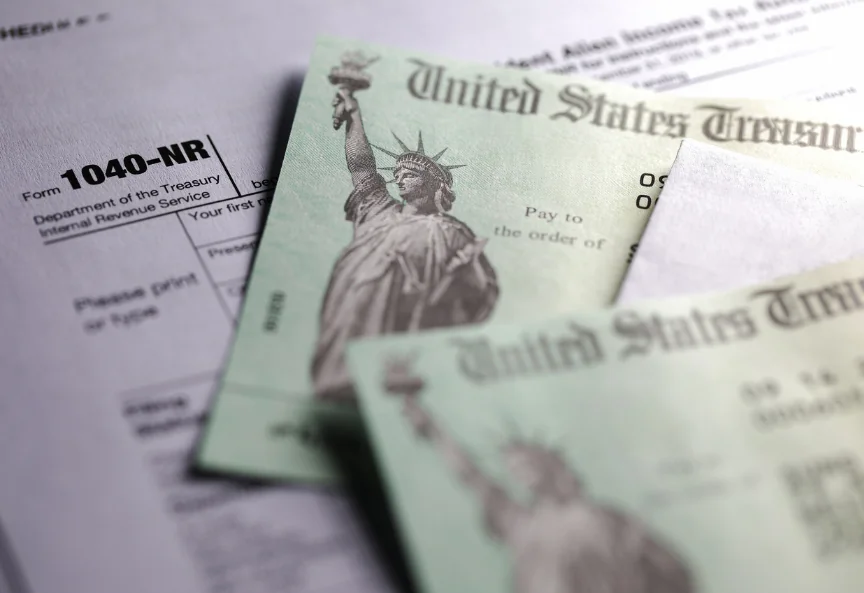*Last Updated on March 23, 2021
[lwptoc skipHeadingLevel="h3,h4"]
When the coronavirus crisis first began, Congress responded by rolling out a number of bills aimed at providing financial aid to individual Americans as well as state and local governments, in order to help subdue the hemorrhaging effects of the virus on the American economy.
One of these bills, the Coronavirus Aid, Relief, and Economic Security Act (CARES Act) included IRS Economic Impact Payments, a one-time $1200 cash check to individuals, and $2400 to married couples, with an additional $500 per dependent.
The IRS is responsible for sending these checks out, and has been doing so since April 24, 2020, at a rate of about 5 million checks per week. As of late August, the IRS has released a public statement detailing how many checks they have sent to individuals per state, and it continues to advise taxpayers and citizens who have not yet received a stimulus check to review their eligibility, and understand that checks are still being sent out.
What are the IRS Economic Impact Payments?
The IRS Economic Impact Payments (EIP) are, as of now, a one-time payment of $1200 to every eligible American, and $2400 to married couples, with an additional $500 per dependent. Most taxpaying Americans who are up to date on their tax returns and earn an adjusted gross income of up to:
-
-
- $150,000 for married couples with joint returns,
- $112,500 for head-of-household filers,
- $75,000 for other individuals,
-
Are eligible to receive the full EIP and have likely already received their check. Americans with a total adjusted gross income above these thresholds will receive a reduction on their EIP, based on 5 percent of how much more they earn.
Recipients of Social Security retirement, survivor, or disability benefits, Railroad Retirement benefits, SSI, and VA C&P will automatically receive their $1200.
In addition, Non-Filers can also request an Economic Impact Payment by November 21, 2020 if:
-
-
- Your income is less than $12,200
- You’re married filing jointly and together your income is less than $24,400
- You have no income
-
Note that you should not use the Non-Filers tool if you will be filing a 2019 return.
Who Does Not Qualify for an EIP?
Some taxpayers do not qualify for an EIP. Non-qualifying criteria include:
- An adjusted gross income of more than:
-
-
- $198,000 for married couples filing jointly,
- $136,500 for head-of-household filers,
- $99,000 for individuals,
-
- Individuals who are dependents on someone else’s tax return,
- Individuals without a Social Security number valid for work,
- Nonresident aliens,
- Incarcerated individuals,
- Non-persons (estates and trusts),
- Deceased individuals,
- Taxpayers who in 2019 have filed a:
Other Americans who have not filed tax returns for 2018 or 2019 due to no or low income, and aren’t eligible for the government benefits listed above, are still eligible for an EIP, but must register through the IRS’s website using their non-filer tool. This is important, as the IRS otherwise wouldn’t know to send you a check.
How Long Will Economic Impact Payments Be Available?
Economic Impact Payments will be available by the IRS throughout the entirety of 2020. It is unclear whether that period will be extended should Congress decide to authorize a second round of Economic Impact Payments. Refer to the IRS’s official website on EIPs and the IRS’s news releases for updates or information on second stimulus checks, if or when they’re authorized.
Will We Get a Second Round of Economic Impact Payments?
Whether or not taxpayers will receive another round of IRS Economic Impact Payments, or stimulus checks, is a question that Congress has been wrestling with for months. While there is still bipartisan approval for some type of aid, the details of that aid remain completely undecided.
However, the looming threat of rising infections and an unemployment rate of 8.4 percent may push both parties to try and reach a compromise sooner rather than later.
Any aid package will also include unemployment benefits and other forms of aid, as well as the divisive decision on how best to fund state and local government aid, further complicating discussions. Whether a second stimulus check arrives, and how large that check will be, is thus still up for debate. Be sure to check the IRS’s official portal on coronavirus relief for up-to-date information.
Why Haven’t I Received My Economic Impact Payment?
If you are a qualifying taxpayer who is up to date with their tax returns, it may be that the IRS has not gotten around to sending you your check. However, as mentioned previously, some Americans need to take action in order to claim their checks. If you haven’t filed a tax return in two years due to no or low income, enter your payment information through the IRS’s non-filer tool by November 21, 2020.
If you have received a $1200 check automatically as a government benefits recipient without a tax return, but have not received the additional $500 payments per dependent/child, you had until September 30th to register through the same non-filer tool.
Economic Impact Payment Cards
Some of the IRS Economic Impact Payments will be sent via a debit card, known as the Economic Impact Payment Card. You cannot specifically request that the IRS sends you your EIP in card form.
Right now, the IRS is sending out EIPs via direct deposit, paper check, or debit card. If you received a debit card, but lost it, you can request a free replacement through MetaBank®’s customer service. MetaBank® is the US Treasury’s financial agent. Please see January 2021 Updates to EIP for more information on payment cards.
Other Information to Note
It’s important to note that the IRS will not request information from you via mail or otherwise regarding your Economic Impact Payment, especially personal or financial information. Anyone masquerading as the IRS requesting information in order to send payment is likely a coronavirus scam artist. You must provide your information to the IRS either via previous tax returns, or the IRS’s own official non-filer tool.
*October Updates to Economic Impact Payments
On October 23, 2020 the IRS set November 10 as "National EIP Registration Day" to help non-filers. This final push on Economic Impact Payments is to encourage individuals who do not usually file a tax return to register to receive an Economic Impact Payment.
“Our partner groups have been a critical part of the unprecedented IRS outreach and education campaign this year to contact as many people as possible about these payments,” said IRS Commissioner Chuck Rettig. “As a result, millions of Americans have successfully used the Non-filers portal and received their Economic Impact Payment. Registration is quick and easy, and we urge everyone to share this information to reach as many people before time runs out on Nov. 21.”
*January 2021 Updates to EIP
A second round of Economic Impact Payments has been issued by the Treasury Department and the IRS. The payments include up to $600 for individuals or $1,200 for married couples and up to $600 for each qualifying child. According to the IRS, "most people who have an adjusted gross income for 2019 of up to $75,000 for individuals and up to $150,000 for married couples filing joint returns and surviving spouses, will receive the full amount of the second payment."
This second round of payments has been scheduled to begin delivery on January 4, 2021.
Direct deposit payments may take several days to reach individual accounts, while paper checks and debit cards have begun being mailed and will continue to be mailed throughout January. These mailed payments will take more time to be delivered than direct deposits.
Millions of second-round EIP payments are being issued as prepaid debit cards to speed up the delivery of payments. These Economic Impact Payment Cards (debit cards) issued by Treasury's financial agent, MetaBank and the IRS does not determine who receives a card.
According to the IRS, cardholders have the opportunity to use the debit card to:
-
-
- Transfer funds to a personal bank account
- Make signature or PIN-debit purchases anywhere Visa Debit
- Cards are accepted — in stores, online or over the phone
- Get cash back with a PIN debit purchase where available
- Get cash from in-network ATMs
- Get a replacement EIP Card, if needed
- Check their card balance online, through a mobile app or by phone
-
The form of payment to individuals may be different than the first round of stimulus checks. For example, if you received a paper check in the first round, you may receive a prepaid debit card this second round.
To check the status of your EIP, use the IRS Get My Payment tool.
*March 2021 Updates to EIP
A third round of Economic Impact Payments have been issued by the IRS. These payments will be issued via direct deposit and through the mail as a check, or debit card. Most taxpayers will receive this third round of stimulus the same way they received the first and second rounds of EIP's.
For most individuals, you will receive $1,400. Those with qualifying dependents will also receive an additional $1,400 for each dependent on their returns.
The latest round of EIP's are based on the taxpayer's latest processed tax return - from 2020 or 2019, and includes those individuals who registered with the IRS' Non-Filers tool.
Those eligible for the third round of Economic Impact Payments include U.S. citizens or U.S resident aliens that have a valid Social Security number and adjusted gross income on their tax return lower than:
-
-
- $150,000, if married and filing a joint return or if filing as a qualifying widow or widower.
- $112,500, if filing as head of household.
- $75,000 for eligible individuals using any other filing statuses, such as single filers and married people filing separate returns.
-
To find more information on the third round of stimulus checks, please check IRS.gov or speak to our professionals.
Contact a Tax Professional for More Information
If you’re worried about your stimulus checks, haven’t received your payments, or are unsure regarding eligibility, you can contact a professional tax attorney for more information.
The IRS advises that you do not call or contact them directly with questions regarding Economic Impact Payments. If you cannot find the information you need on their portal and FAQs, a tax professional may be able to provide you with a clear answer.











